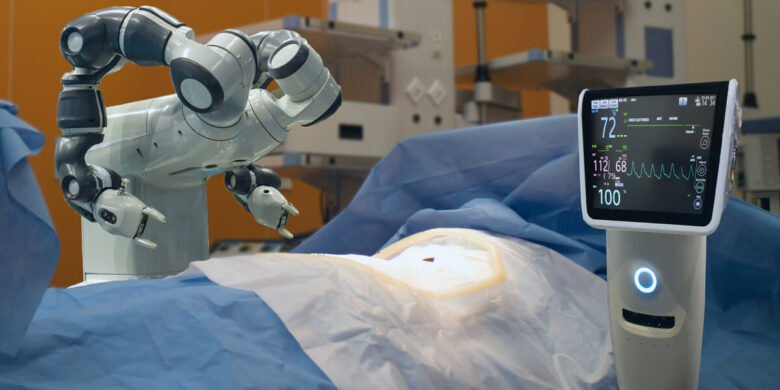Robotics has made tremendous strides in surgery, and artificial intelligence (AI) is playing a key role in pushing the boundaries of accuracy and speed. Once thought to be unique, robotic surgery is now commonplace in operating rooms around the world, and artificial intelligence is making it even better. This story shows how artificial intelligence and robotic surgery can work better together and explores how smart algorithms can help improve accuracy, recovery time, and overall patient outcomes.
How Robotic Surgery is Changing Over Time:
1. Development of Surgical Robots
The rise of medical robots has brought about enormous changes in the field of surgery. When operated by experienced surgeons, these high-tech machines provide greater precision and maneuverability than traditional surgical methods.
2. The Least Harmful Procedure:
Robotic surgery allows doctors to perform minimally invasive treatments, which involve making small incisions and inserting surgical instruments through very small ports. This method causes less damage to the tissue surrounding the wound, resulting in faster healing and fewer problems.
3. Challenges in Traditional Robotic Surgery
Robotic surgery has many advantages, but there are also some problems. Surgeons have difficulty with tactile feedback, feeling things during treatment and quickly adapting to changes that occur during surgery.
Applying AI to Robotic Surgery:
1. Better Image Processing
Artificial intelligence makes image processing during robotic surgery easier. Smart algorithms instantly view high-resolution photos of the surgical site, giving doctors better photos and information that humans can’t see.
2. Machine Learning Helps People make Decisions
Machine learning algorithms help doctors make decisions during surgeries. The vast amounts of data these algorithms look at, such as patient records and previous surgical results, can help surgeons make decisions that are best for each patient.
3. Autonomous Surgical System
Adding artificial intelligence allows surgical equipment to work independently. These intelligently programmed machines can perform certain parts of the operation more accurately and consistently than humans.
How AI can be used in Robotic Surgery in Real Life?
1. Prostate Surgery
Artificial intelligence helps reduce nerve stress during prostate surgery Smart algorithms review image scans to find important structures. This helps the doctor move and protects the nerves, reducing the risk of problems after surgery.
2. Uterine Surgery
Gynecological treatments are improving with the help of artificial intelligence. For example, in a robot-assisted hysterectomy, artificial intelligence can more easily find important structures, improving the accuracy of the procedure and reducing the chance of problems.
3. Bone Surgery
Artificial intelligence is a very important part of orthopedic surgery, especially in joint replacement. Smart algorithms look at pre-surgery images to help doctors plan optimal implant placement, leading to better outcomes for patients.
Why Could Artificial Intelligence Aid Robotic Surgery?
1. Better Accuracy
What artificial intelligence adds to robotic surgery is that it can make things more precise. Intelligent algorithms process the real-time data to give surgeons precise information that makes it easier for them to carry out accurate surgeries.
2. It Takes Less Time to Heal
Minimally invasive robotic surgeries, guided by artificial intelligence, often help patients recover faster. Because robotic instruments are so precise, they cause less damage to nearby tissue. This helps people recover faster and shorten their hospital stay.
3. Modified Surgical Plan
Artificial intelligence makes it possible to develop personalized surgical plans. Machine learning algorithms look at each patient’s information to tailor the surgical approach, taking into account differences between individuals and improving outcomes based on specific anatomical factors.
Questions and Things to Think About:
1. Training and Introduction
Adding artificial intelligence to robotic surgery means doctors and other healthcare workers will need special training. To use these tools effectively, you need to know a lot about intelligent algorithms and autonomous systems.
2. Impact on Ethics and Law
When artificial intelligence is used in operations, it raises ethical and legal issues. Some key issues to consider include who is responsible for errors, obtaining patient consent for AI-enabled processes, and how to use patient data in an ethical manner.
3. Impact on Costs
There are costs associated with using AI-controlled robotic treatments. Healthcare organizations should calculate the necessary costs by considering the initial investment, ongoing maintenance and potential long-term benefits to patient outcomes, and by making optimal use of resources.
New Ideas and Directions for the Future:
1. Distal Robotic Surgery
Robotic surgery is now using artificial intelligence for distal treatment. By using intelligent algorithms to precisely control robotic systems, surgeons may be able to perform operations remotely. This allows people in areas where there are not enough doctors to access their skills.
2. Robots that Work Together
Collaborative robots are a new trend where robots powered by artificial intelligence work together with human doctors in real time. This joint approach uses the best qualities of people and machines to achieve optimal medical results.
3. Real-time Learning Algorithm
Algorithms that learn during the operation and change and improve during the operation are the way forward. These smart systems can continuously learn from what the surgeon does, how the patient responds, and how the surgery is progressing, making them better over time.
Conclusion:
Adding artificial intelligence to robotic surgery ushers in a new era of surgical accuracy and patient care. Artificial intelligence is changing surgery in many ways, from better imaging and decision aids to the possibility of self-driving systems. As these technologies continue to improve, the ability of human doctors and intelligent algorithms to work together could change what can be done in the operating room. While there are still questions and things to think about, the way artificial intelligence is developing in robotic surgery suggests a future where accuracy will exceed what humans can achieve. This makes the operation safer, more personal and more effective.
FAQs:
1. How can AI improve the accuracy of robotic surgery?
Artificial intelligence increases precision by providing real-time data analysis during robotic surgery. Intelligent algorithms process high-resolution images and help surgeons perform precise operations that are beyond human capabilities.
2. Can you tell us more about the role of artificial intelligence in autonomous surgical systems?
Artificial intelligence contributes to autonomous surgical systems by guiding certain aspects of surgery with precision and consistency. These systems can carry out tasks beyond those of conventional robotic surgery to improve results because of clever algorithms.
3. What benefits does artificial intelligence bring to prostate surgery, especially nerve-sparing surgery?
In prostate surgery, artificial intelligence helps with nerve-sparing operations by analyzing image scans. This helps the surgeon navigate and preserve critical structures, reducing the risk of postoperative complications.
4. How can artificial intelligence help robotic surgery speed up recovery?
Artificial intelligence-driven robotic surgery, which is minimally invasive, helps reduce recovery time. The reduced tissue trauma and precision of robotic instruments can speed healing, shortening patients’ hospital stays.
5. What are the considerations for the ethical and legal implications of artificial intelligence in robotic surgery?
The use of artificial intelligence in surgery raises ethical and legal considerations, including liability for errors, patient consent for AI-assisted surgeries, and the ethical use of patient data. These aspects require careful evaluation and compliance with ethical standards.



